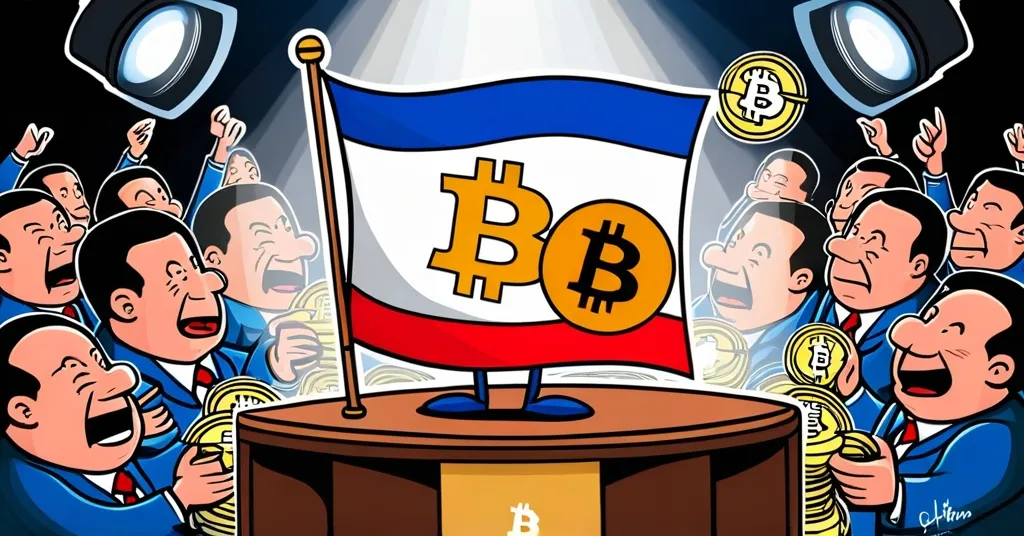El Salvador’s Bukele Aims to Buy U.S. DOJ’s Silk Road Bitcoins at a Discount

El Salvador’s President Nayib Bukele Eyes Discount on U.S. DOJ’s Silk Road Bitcoin Auction
El Salvador’s President Nayib Bukele recently tweeted, “Maybe we’ll all get the chance to buy Bitcoin at a discount!”—a bold statement aimed at the U.S. Department of Justice’s upcoming auction of 69,370 Bitcoins seized from the Silk Road, valued at around $6.5 billion.
- U.S. DOJ to sell off 69,370 Bitcoins from Silk Road.
- El Salvador holds 6,022.18 BTC, plans to acquire 20,000 more in 2025.
- Bukele sees opportunity to buy Bitcoin at a discount.
- Country continues “buy one Bitcoin a day” despite IMF loan.
- Stacy Herbert reaffirms commitment to Bitcoin strategy.
The Silk Road was a notorious online marketplace where illegal goods were traded using Bitcoin. After its shutdown a decade ago, the U.S. government seized a significant amount of Bitcoin, which it now plans to sell. Bukele’s tweet isn’t just a cheeky remark; it’s a strategic move that could reshape El Salvador’s financial future.
El Salvador, which made Bitcoin legal tender in 2021, allows its citizens to use Bitcoin to pay for goods and services, just like using dollars. This pioneering move was aimed at promoting financial inclusion and attracting foreign investment. As of January 9, 2025, the country holds 6,022.18 BTC, valued at around $562 million, and plans to acquire an additional 20,000 BTC throughout the year. Bukele’s interest in the Silk Road Bitcoin auction aligns with El Salvador’s ongoing “buy one Bitcoin a day” strategy, demonstrating a continued commitment to its crypto ambitions.
Despite securing a $1.4 billion loan from the International Monetary Fund (IMF), which has expressed caution about El Salvador’s Bitcoin strategy, the country remains undeterred. Stacy Herbert, director of El Salvador’s Bitcoin Office, firmly states, “Just as the US plans to become the number one Bitcoin country, so too are we free to compete for that spot.” The IMF loan agreement introduces some compromises, like making Bitcoin acceptance voluntary for businesses and restricting public sector involvement in Bitcoin-related activities. Additionally, the Chivo wallet, a tool used for international payments, may be phased out or sold, signaling a shift in how El Salvador engages with Bitcoin.
“Maybe we’ll all get the chance to buy Bitcoin at a discount!”
“Just as the US plans to become the number one Bitcoin country, so too are we free to compete for that spot.”
While El Salvador’s Bitcoin strategy is ambitious, it’s not without its challenges. Regulatory hurdles, Bitcoin’s notorious volatility, and the potential for economic instability all pose risks. Critics argue that betting a nation’s economy on Bitcoin’s volatile swings is a dangerous gamble, but Bukele remains undeterred. The country’s journey with Bitcoin continues to be a fascinating case study in the potential and pitfalls of embracing cryptocurrency at the national level.
El Salvador’s bold move to potentially buy America’s Bitcoin at a discount is not just about increasing reserves; it’s a statement of intent in the global race towards digital currency adoption. Bukele’s vision is clear: to lead El Salvador into a future where Bitcoin plays a central role, not just as a speculative asset but as a cornerstone of economic policy. Whether this experiment will pay off remains to be seen, but one thing is certain: El Salvador is all in on Bitcoin, ready to buy at a discount and continue its journey towards financial independence.
Key Questions and Takeaways:
- What is the significance of the U.S. DOJ’s decision to sell Silk Road Bitcoins?
The decision to sell off approximately 69,370 Bitcoins seized from the Silk Road marks a significant event in the cryptocurrency market, potentially impacting Bitcoin’s price and offering a chance for investors like El Salvador to purchase at a discount.
- How does El Salvador’s Bitcoin strategy align with its economic goals?
El Salvador’s strategy to increase its Bitcoin holdings aligns with its goals of financial sovereignty and challenging traditional financial systems, aiming to establish itself as a leader in cryptocurrency adoption.
- What impact does the IMF loan agreement have on El Salvador’s Bitcoin strategy?
The IMF loan agreement introduces some restrictions on Bitcoin use within El Salvador, such as making acceptance voluntary for businesses and limiting public sector involvement, yet the country remains committed to its Bitcoin strategy.
- What are the risks and challenges associated with El Salvador’s Bitcoin adoption?
Risks include regulatory hurdles, the volatility of Bitcoin’s value, and the potential for economic instability, while challenges involve integrating cryptocurrency into a national economy and navigating international financial relationships.
- What does El Salvador’s continued Bitcoin purchases signify in the global crypto landscape?
El Salvador’s ongoing Bitcoin purchases signify a commitment to cryptocurrency as a tool for economic empowerment and a potential model for other nations considering similar strategies, highlighting the global competition for dominance in the digital currency space.



